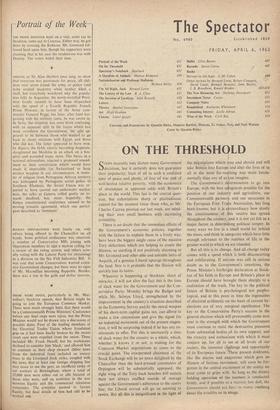-Portrait of the Week — I PRIME MINISTER went on a
visit, some say to Stockton, some say to Canossa. Either way, he got there by crossing the Rubicon. Mr. Grimond fol- lowed hard upon him, though his supporters were claiming that in his case the rendezvous was with Destiny. The voters bided their time.
ABROAD, as Sir Alan Herbert once sang, to show that everyone was passionate for peace, all chil- dren over seven joined the army or police (and baby studied musketry while mother filled, a shell, but everybody wondered why the popula- tion fell). In Argentina, the newly-installed Presi- dent Guido seemed to have been dispatched with the speed of a Fourth Republic French Prime Minister, in favour of the Army com- mander General Poggi, but later, after hard bar- gaining with the military junta, he was sworn in. In Syria, the situation was even more confusing, with an dpparent split in the forces which last week overthrew the Government; the split ap- peared to be between those who wanted to go back to closer relations with Egypt, and those who did not. The latter appeared to have won. In Algiers, the OAS, clearly becoming desperate, slaughtered ten Moslems in an attack on a hos- pital, and wounded many more. The Swiss, in a national referendum, rejected a proposed amend- ment to their constitution which would have made it impossible for Switzerland to have nuclear weapons in any circumstances. A minis- ter of religion from Portuguese African territory was kidnapped by Portuguese secret police in Southern Rhodesia, the Soviet Union was re- ported to have carried out underwater nuclear tests, the talks at Geneva rolled gently on to- wards deadlock but, more hopefully, the Kenya constitutional conference seemed to be moving towards agreement, which one partici- pant described as 'imminent.'
*
BUDGET PREPARATIONS went busily on, with advice being offered to the Chancellor on all hands. Some political restlessness was observed, a number of Conservative MPs joining with Opposition members to sign a motion calling for a review of the rating system, and others actu- ally voting with the Labour Party (or abstaining) in a division on the Sea Fish Industries Bill. It was said that some Conservatives wanted exten- sive Government changes, but there were no signs of Mr. Macmillan becoming flappable. Besides, there was a rise in the gold and dollar reserves.
THERE WERE HINTS, particularly in Mr. Mac- millan's Stockton speech, that Britain might be going to join the European Common Market. There were much stronger hints that there would be a Commonwealth Prime Ministers' Conference before any final steps were taken, but the Prime Minister would not be drawn into a discussion of possible dates. Four of the leading members of the Electrical Trades Union whose fraudulent grip on it had been finally broken by the recent court case were expelled from the union. These included Mr. Frank Haxell, but his workmates declined to consider him 'black,' and allowed him to continue as their shop steward. Other news from the industrial front included an uneasy truce in the Liverpool dock strike, coupled with the news that at least one foreign shipping line may cease to use the port, an unofficial strike of car workers at Birmingham, where a total of 22,000 men were either out or idle because of those who were, and an armistice in the war between Equity and the commercial television companies. The armistice seemed to favour Equity, but final details of fees had still to be Worked out.


































 Previous page
Previous page